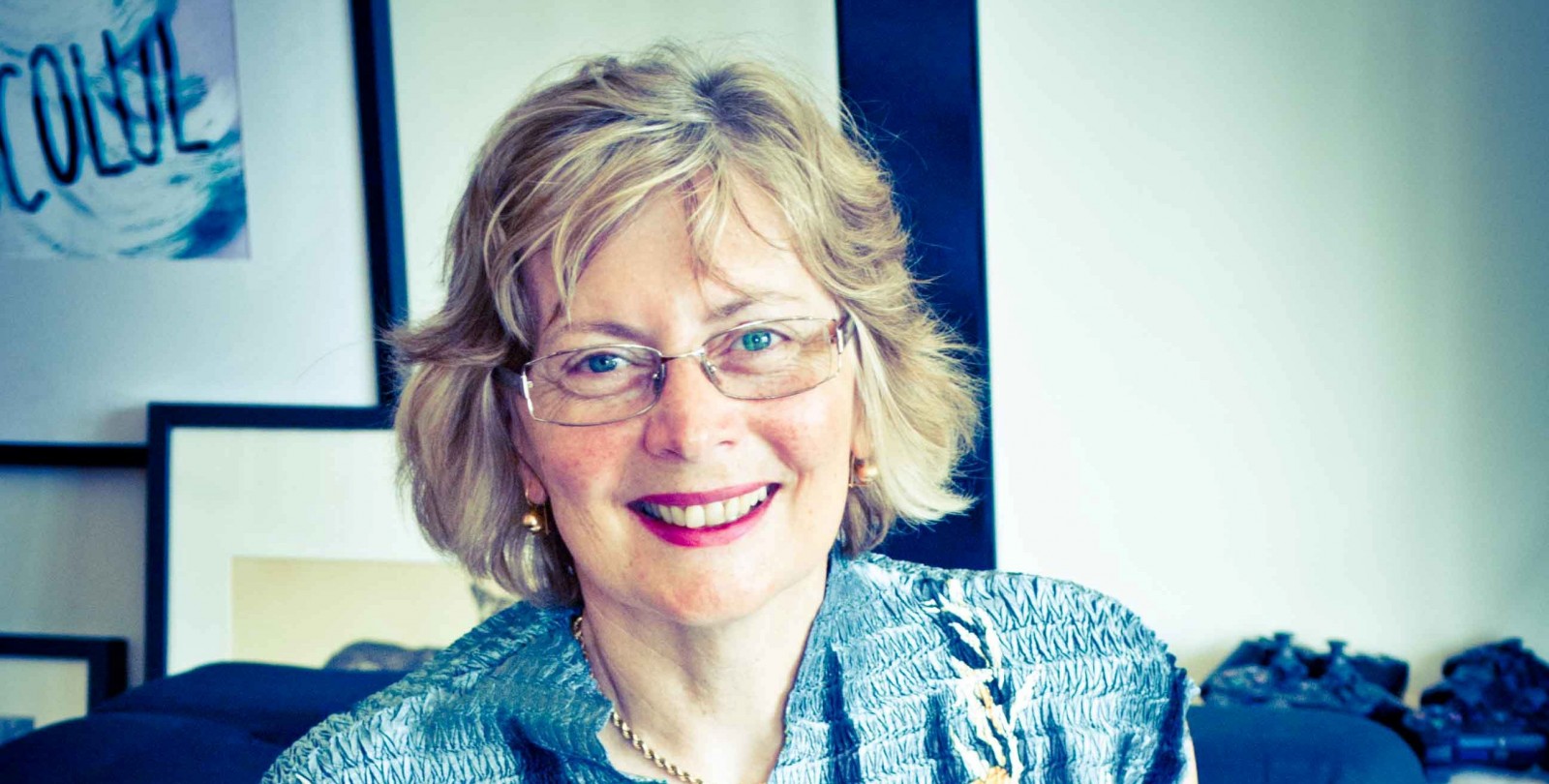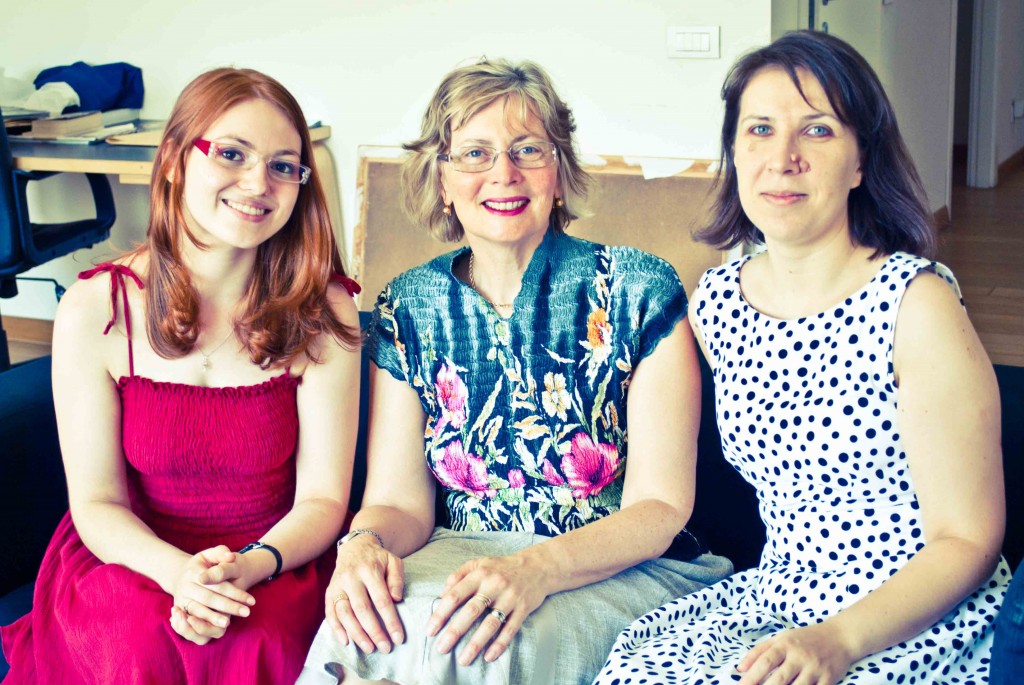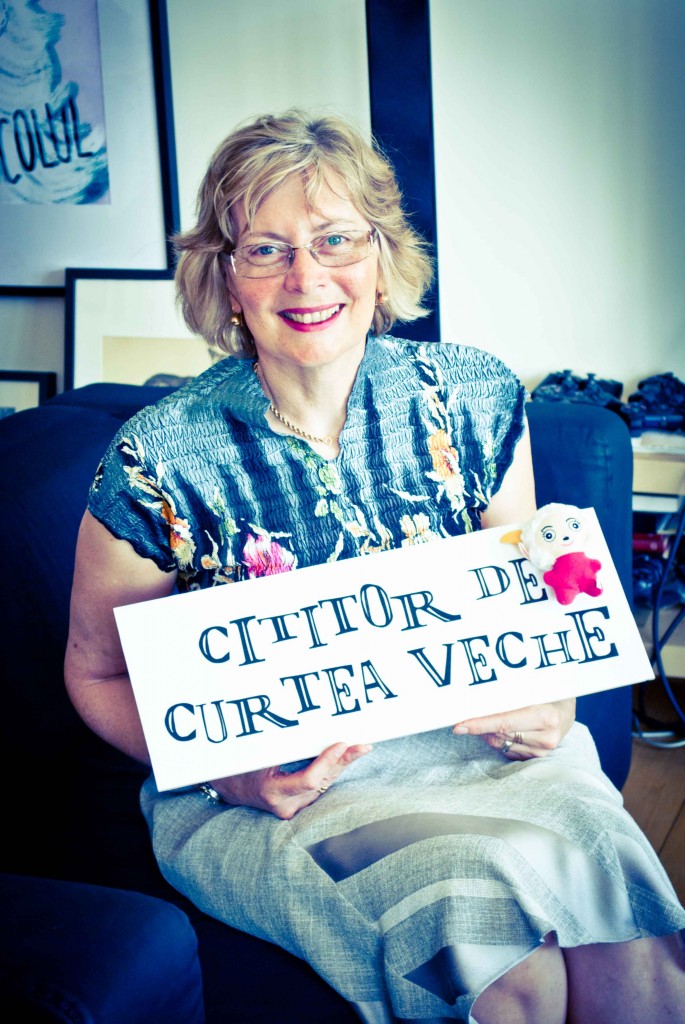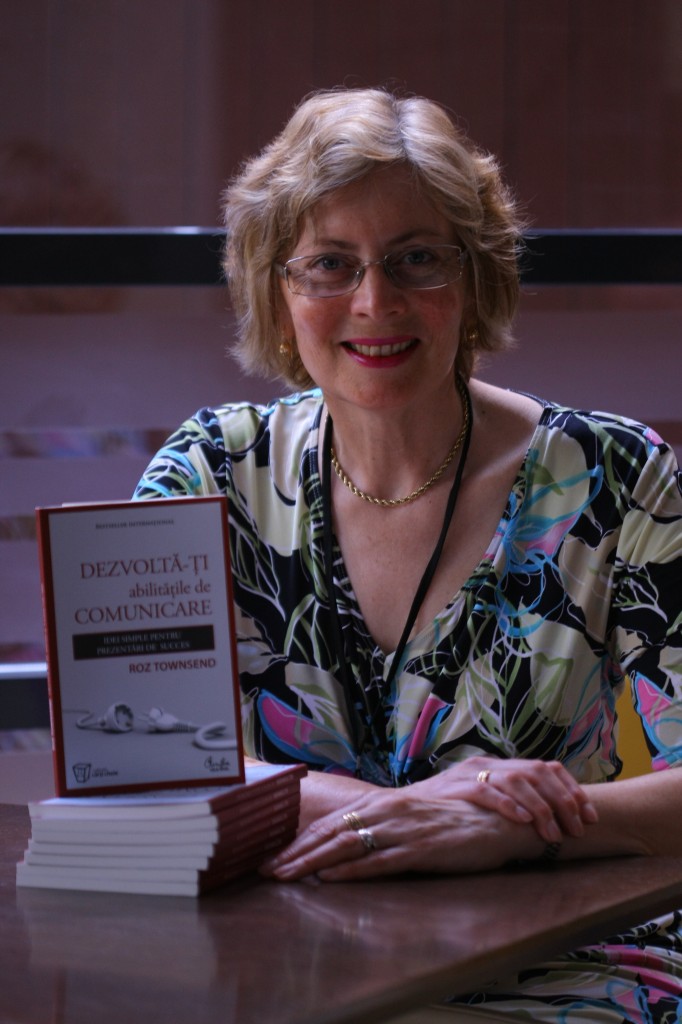The Australian author Roz Townsend has recently ended her trip around Europe, which also included two visits to Romania. Our first encounter was on the 2nd of July at Godot Cafe-Theater, when we discussed about successful presentations, just a few days after Roz had a bicycle ride along the Danube Delta. We met again in Bucharest on the 24th of July to say our goodbyes, not before we had a long discussion about her Romanian experience. The first part of that interview is next.
Roz Townsend is a successful trainer and the author of the book „The Presenter Within – Simple Ideas for Great Presentations”.
Roz Towsend, Miruna Meiroșu and Ștefania Nalbant
Miruna Meiroșu: You have just ended your trip to Europe. What countries have you visited and how do you feel now, at the end of this experience?
Roz Townsend: I think we are very lucky. We went to Serbia and Croatia, Montenegro, a very short trip to Albania then to Austria and Hungary so we’ve had a wonderful trip around Eastern Europe. And how do I feel? I feel very privileged to have seen parts of the world that perhaps many people have not seen, especially the Danube Delta, Tulcea and Sulina. It makes me appreciate my own home as well, I think our climate in Australia is far more suitable for me. Having 37 degrees heat and then thinking you might get down to -25 is quite a shock for my system. I think our -1 or -3, where we live at home is cold enough for me. Also I feel exhilarated because I have another book that I’m really quite determined to write. Partly that was for me inspiration of the talk that we did at Godot Theatre with some of the comments.
M.M. What is this new book about?
R.T. This book is about the essence of language and communication. For example we have created the words right and wrong as important in the way we live, good and bad, morality. We have created those, but they’re not the truth. We could just as easily have said integrity is more important than right or wrong, or generosity is more important that good or bad. I want to write a book to get people thinking about what is it that we’ve done with language to create the world that we’ve got. Because the language that we use created our world. I know it’s a bit esoteric, but it’s not just my ideas, I can’t just say that I’ve created it. These are ideas that I’ve been picking up in a variety of my studies in landmark education, in conflict coaching and mediation, but I really think that the distinction most people live by – right and wrong – gives us very limited possibility as humans on the planet. If we had distinctions like, as I’ve said, integrity or responsibility, we as a species would elevate our whole level of existence. For example, as long as Muslims or Christians or Jews think that they are right, then they think the other person is wrong. So as long as we have right or wrong as the key stones or foundations of our thinking, we’re always going to have wars on the planet.
When I touched on that idea, I could sense there were a couple of people in the audience who really understood what I was talking about and demanded more information and I think the time is right to rethink that. You know I’m really confronted by the terrible death in America, where that young man shot all those people and the Americans are saying the second amendment says `It’s our right to bare arms, to have guns.` Well, before the second amendment, there was no second amendment. They created the second amendment, so if they created it, they could recreate it. It worked in the time in history when it was important, but I think that if you look what is happening in American society now, the right to bare arms, have all this ammunition, does that hold for a workable society? I personally don’t think so. I think that the typical example, just because it got created in history, people think it’s the truth and set it in concrete. But someone should start questioning what they think it’s the truth, because this isn’t the truth. It’s a structure that worked for the time it got created, but it’s not necessarily the structure we need to take society and humanity to where we need to go in the future.
M.M. That’s very interesting and I’m really glad you found inspiration in the event we had here and probably from this whole confrontation of cultures and of different ideas.
R.T. Absolutely. For example, when I think of the invading tribes of different countries, they thought they were right because greed was more important than working together. And I can understand that in the years gone by, that was normal, but it doesn’t have to be who we are in the future. If we said it is more important to be cooperative than to win, or it’s more important that we both win, rather than we have winners and losers. We could change that thinking and you’re right, I think that the inspiration really came from a number of people in the audience who really understood and they were like plotting paper, they were sulking up my ideas and I could tell they were demanding more and wanted to take the ideas further.
So the book will be in the style that I normally write, which is to try and make fairly academic information in a very user friendly format that doesn’t become academic text, but becomes something easy to read and easy to share and talk about. It becomes a spring board and people want more information at a more academic and intellectual level. I’m so excited about that and frustrated that I don’t have my computer with me to get it all happening, It’ll be my number one priority because I think if we can start getting people to thinking about this, we can have a huge impact on having greater people on the planet which is what we’re capable of and what we’d all prefer, because everyone wants to bring up their children in a friendly society, where they’re loved and nurtured. That’s the bottom line for everyone, really, and the other things are just stories or they weren’t the truth. They worked years ago, in history, but right now we need something else.
M.M. You have visited Romania for the first time. How do you feel, what has impressed you most (both positives and negatives)?
R.T. I think going straight into the Danube Delta was such a wonderful thing to do, to look nature fairly unimpeded by organizations, to look at the flora and fauna, the wild horses as we cycled along the narrow river ways. That was really quite a privilege to see where the great Danube came into the Black Sea. It was really lovely going through some of the villages on our bikes that had an incredible Russian appearance to them. Well, lovely and sad, sad because the people had to leave their country and come here to avoid persecution, but to see how that culture blended into Romania was lovely. And simple pleasures like riding my bike in the middle of the summer sun and then reaching up to pick an apricot in the middle of the street or a peach or a plum. I thought that was such a treat and the trees were just so plentiful. It wouldn’t have mattered to anyone how many apricots or peaches or plum got eaten, there were enough for everyone to share. That was the very simple pleasure.
As for the negative, I think of the impact that the communist history of Romania had. It’s very sad to see so many beautiful buildings that have so much potential. I kept telling my friends in Australia: Oh, Romania is a renovating delight. There would be so many beautiful buildings that we can take and restore and I hope the next time I come back the restoration process has funded ahead with great energy and vitality because some of the buildings are breathtakingly beautiful, a bit of love and care put into them. I was really sorry we didn’t get to hear a concert in your beautiful concert hall, though we did get to visit that. We did get to go to a concert in Budapest. But to see such a beautiful building that was such a treat in itself as well and my experience with the Romanian people, their willingness to accept us as strangers and their friendship has been lovely. And on the professional level to know that my work is taken up with such energy and enthusiasm, I find that very exciting, it makes me want to give even more to Romanian readers, because if they like that then we can develop a much stronger relationship that will be great.
M.M. The participants at the event are exactly the subject I was going to approach next. Did you have any expectations about the audience here? How did you find it?
R.T. On the one hand I thought more people would speak English or speak better than what they do in Romania so it was a bit of a shock to me as a tourist, English was just starting to take off. Younger people could help out, but a lot of people were unable to help with English. But on the other hand when we were at Godot Theatre the young professional people had an excellent knowledge of English, I thought I would have to talk much slower than what I did, I had to explain far more things, but they were really up to speed and I thought that was very exciting. That was a good indication of what’s going to happen, not that I think that English is the best language in the world but I think it’s good through out the world that there is a common language that people can communicate with each other. My husband said English is now the new lingua franca, but when you think of that whole term, lingua franca is Latin and it means French language. So we’ve got three languages that we’re talking about, but at the moment it’s English so that’s really great that we have a common language. I don’t know if English will be the common language in the future, it could as well be mandarin, but at the moment the more that can speak one language the better it is for us all.
Photo credit: Ioana Enescu and Codrin Prisecaru





Trackbacks/Pingbacks